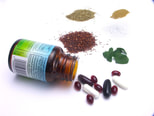|
For thousands of years, cultures world-wide have relied on consuming natural products such as food and drinks in order to sustain strong minds and healthy bodies. However, over the last century, nutritional supplements have been made available for consumption as an addition to the nutrients received from daily nourishment. According to a 2013 Gallup survey, half of Americans currently take a vitamin or supplement to augment their daily health care routine in order to assist them in maintaining a positive, healthy lifestyle.[i] How much do you actually know about the supplements that you are putting into your body? Could your “healthy” dietary supplements actually be doing you more harm than good?

Ingredient purity is a major concern, as the industry does not regulate the manufacturing of nutritional supplements. Even though there are federal regulatory agencies such as the Food and Drug Administration (FDA) and the Federal Trade Commission (FTC), the responsibility of which department should monitor nutritional supplements is blurred. The FTC states that they work jointly with the FDA, but that the FDA is primarily responsible for “claims on product labeling, including packaging, inserts”.[ii] Meanwhile, the FDA claims that “the manufacturer is responsible for ensuring the accuracy and truthfulness of these claims; they are not approved by FDA”.[iii] It would appear that there is a bit of a discrepancy between how these issues are handled, which leaves room for major safety concerns. The New York Times reports that supplements often do not contain the item they are labeled as, finding that nearly one-third of supplements tested showed zero trace of at least one of the ingredients indicated on the label.[iv] If the product listed isn’t what is in your supplement, then what is? Often supplements contain fillers that are not listed on the label in order to cut corners, which can turn deadly. Subsequently, since none of these items are regulated, there could be any number of hazards involved with these mystery ingredients, from dangerous levels of mold or toxins, to potentially lethal allergens. Rigorous inspection is the only way to ensure the safety and quality of nutritional supplements. One of the techniques to achieve this is Good Manufacturing Practice (GMP) certification obtained through vigorous exams per the International Society for Pharmaceutical Engineering (ISPE).[v] The GMP certification process includes all facets of production: testing the quality of materials used, inspecting the cleanliness of the manufacturing facilities and equipment used, and assessing the training and personal hygiene of the employees. Remember, just because you take a nutritional supplement for your health, that doesn’t necessarily mean regulations have been followed in the production and manufacturing of this item. Be diligent about the choices you make as a consumer and what you choose to put into your body. No one can tell you what is right for you, except YOU! Listen to your body and your gut instincts when it comes to whatever you ingest! Love and Light, xo Arielle Sterling Wanting to learn more about the resources I used? Check them out below: [i] http://www.gallup.com/poll/166541/half-americans-vitamins-regularly.aspx [ii] http://www.business.ftc.gov/documents/bus09-dietary-supplements-advertising-guide-industry [iii]http://www.fda.gov/Food/DietarySupplements/QADietarySupplements/default.htm [iv]http://www.nytimes.com/2013/11/05/science/herbal-supplements-are-often-not-what-they-seem.html?pagewanted=all&module=Search&mabReward=relbias%3Ar%2C%7B%222%22%3A%22RI%3A15%22%7D&_r=0 [v] http://www.ispe.org/index.php?ci_id=2670 P.S. Want to keep up with my latest blogs and offerings? Make sure you sign up for the mailing list and receive a FREE gift as my thank you for being on this journey together!
0 Comments
Leave a Reply. |
Arielle SterlingArielle is a best-selling author, holistic life coach and intuitive energy healer. Archives
July 2024
Categories
All
|


 RSS Feed
RSS Feed